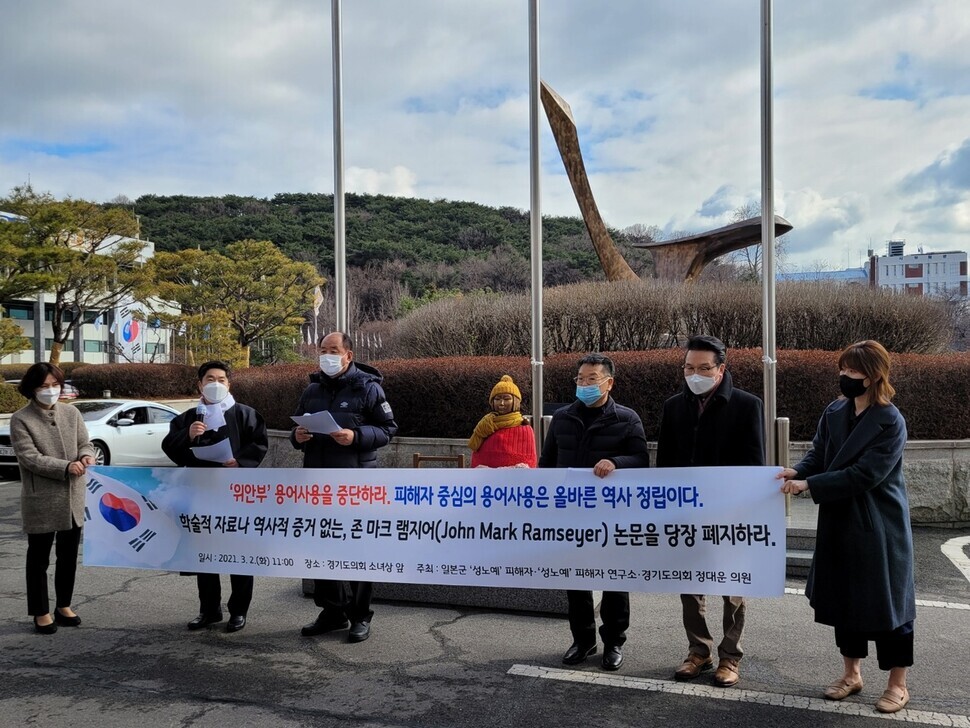hankyoreh
Links to other country sites 다른 나라 사이트 링크
Family members of “comfort women” victims call for new legislation to punish historical distortion

Kim Soon-duk (1921-2004) suffered a harsh life. A native of Uiryeong, South Gyeongsang Province, she traveled to Shanghai after being deceived by claims that women were being recruited to work at factories in Japan, only to be forced to work as a “comfort woman” at a Japanese military brothel.
“If I had another life to live, I’d like to be a soldier protecting the Republic of Korea,” she used to say.
“It may have been her lingering feelings of bitterness over being a victim of sexual slavery by the Japanese military, but my mother always used to talk about how she wished she could be a soldier defending her country,” said her son Yang Han-seok, chairman of the Association of Family Members of Victims of Japanese Military Sexual Slavery.
That association and other family members of comfort women victims held a press conference Tuesday with Gyeonggi Provincial Council member Jeong Dae-woon in front of the council’s statue of a young girl commemorating the comfort women. Their message was a call for the retraction of an academic paper on the comfort women published by Harvard Law School professor J. Mark Ramseyer, along with enactment of legislation to punish historical distortions and reckless remarks.
Yang learned from his mother about her experience as a comfort woman the year after Kim Hak-soon became the first Korean survivor to come forward publicly in 1991.
“The whole family wept after hearing what my mother told us,” he recalled.
“We wanted to bring her back home with us [after she went to live at the House of Sharing following her public statements], but she said she couldn’t go home until she’d received an apology from Japan,” he said.
“She continued fighting to let people know about the damages of the Japanese military’s sexual slavery system until she eventually passed away in 2004, without ever having received an apology.”
The association’s vice chairman is Seo Byeong-hwa, son of former comfort woman Lee Yong-nyeo, who passed away in 2013.
“Japan seems to think that the issue of Japanese military sexual slavery victims will be resolved once they pass away, but their family members will step forward as witnesses themselves,” he said.
“To resolve the issues concerning the victims, we’re demanding the use of the term ‘victims of Japanese military sexual slavery,’ which is a way of providing an accurate understanding of the Japanese military’s responsibility, rather than the term ‘Japanese military comfort women victims,’ which centers on the perpetrators,” he added.
Ahn Sin-kwon, director of the Research Institute for Victims of Japanese Military Sexual Slavery, said, “After Ramseyer’s paper came out characterizing victims of Japanese military sexual slavery as ‘prostitutes,’ we’ve seen people even here in Korea making outrageous statements mocking the victims.”
“If we simply condone this as ‘freedom of expression,’ we will not have done our historical duty,” he said.
“The National Assembly needs to enact a special law to prevent historical distortions and protect the victims’ dignity,” he urged.
Of roughly 240 confirmed South Korean victims of Japanese military sexual slavery, 15 are still alive today.
By Hong Yong-duk, senior staff writer
Please direct comments or questions to [english@hani.co.kr]

Editorial・opinion
![[Editorial] Yoon must halt procurement of SM-3 interceptor missiles [Editorial] Yoon must halt procurement of SM-3 interceptor missiles](https://flexible.img.hani.co.kr/flexible/normal/500/300/imgdb/child/2024/0501/17145495551605_1717145495195344.jpg) [Editorial] Yoon must halt procurement of SM-3 interceptor missiles
[Editorial] Yoon must halt procurement of SM-3 interceptor missiles![[Guest essay] Maybe Korea’s rapid population decline is an opportunity, not a crisis [Guest essay] Maybe Korea’s rapid population decline is an opportunity, not a crisis](https://flexible.img.hani.co.kr/flexible/normal/500/300/imgdb/original/2024/0430/9417144634983596.jpg) [Guest essay] Maybe Korea’s rapid population decline is an opportunity, not a crisis
[Guest essay] Maybe Korea’s rapid population decline is an opportunity, not a crisis- [Column] Can Yoon steer diplomacy with Russia, China back on track?
- [Column] Season 2 of special prosecutor probe may be coming to Korea soon
- [Column] Park Geun-hye déjà vu in Yoon Suk-yeol
- [Editorial] New weight of N. Korea’s nuclear threats makes dialogue all the more urgent
- [Guest essay] The real reason Korea’s new right wants to dub Rhee a founding father
- [Column] ‘Choson’: Is it time we start referring to N. Korea in its own terms?
- [Editorial] Japan’s rewriting of history with Korea has gone too far
- [Column] The president’s questionable capacity for dialogue
Most viewed articles
- 1Months and months of overdue wages are pushing migrant workers in Korea into debt
- 2[Guest essay] Maybe Korea’s rapid population decline is an opportunity, not a crisis
- 3Dermatology, plastic surgery drove record medical tourism to Korea in 2023
- 4Under conservative chief, Korea’s TRC brands teenage wartime massacre victims as traitors
- 5[Column] Can Yoon steer diplomacy with Russia, China back on track?
- 6First meeting between Yoon, Lee in 2 years ends without compromise or agreement
- 7“Korea is so screwed!”: The statistic making foreign scholars’ heads spin
- 8[Editorial] Japan’s rewriting of history with Korea has gone too far
- 9Two factors that’ll decide if Korea’s economy keeps on its upward trend
- 10[Column] For K-pop idols, is all love forbidden love?